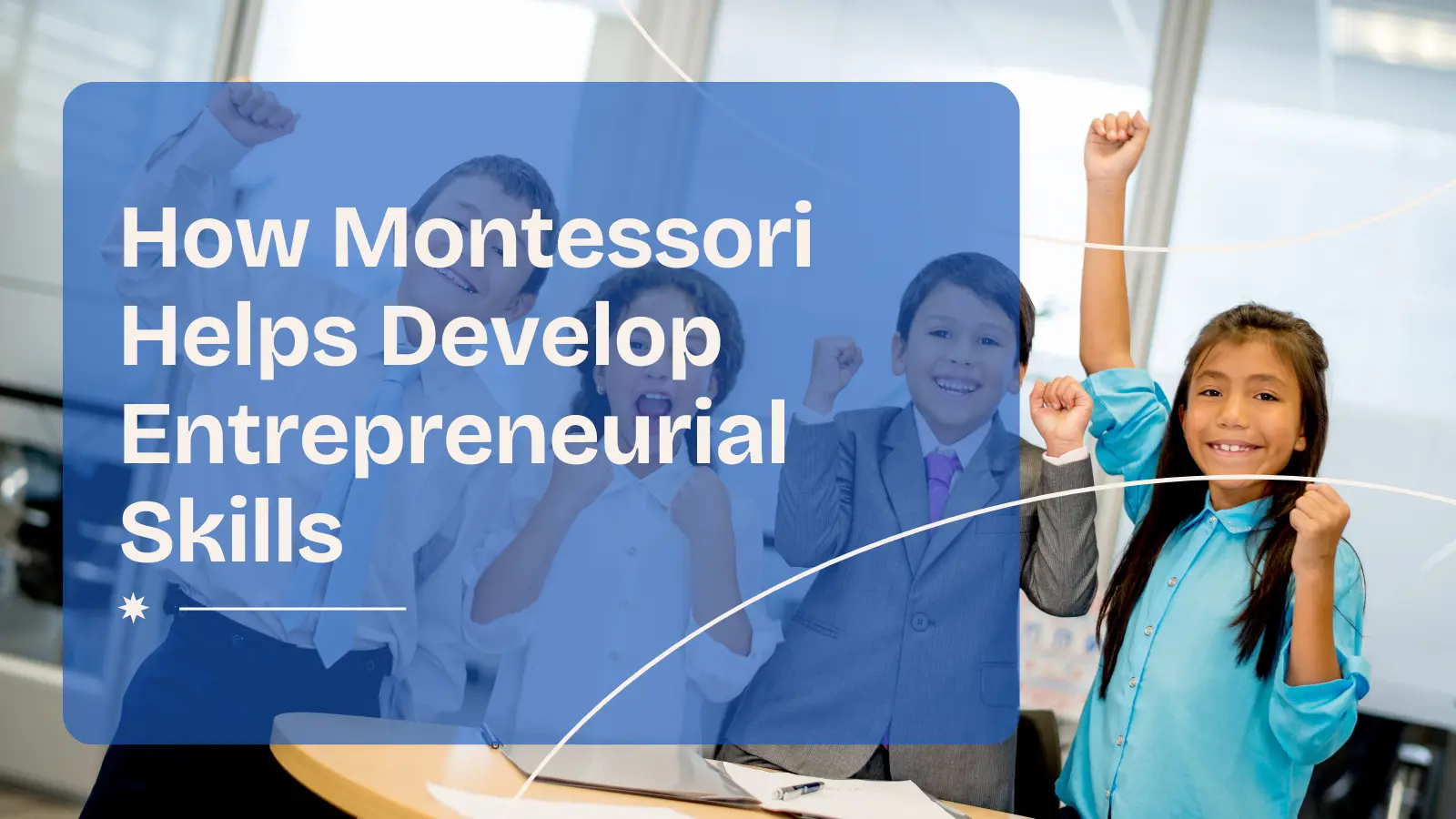Blog
How Montessori Helps Develop Entrepreneurial Skills in Kids

In an age where kid entrepreneurs are making headlines and launching startups before even going to high school, the question arises—how do we nurture entrepreneurial skills or business skills from a young age?
While some believe entrepreneurs are born, others argue it’s all about the environment.
Enter Montessori education—a child-centered approach known for fostering independence, creativity, and leadership.
But can it really shape the next generation of Kidpreneurs?
The answer is a resounding yes. Let’s find out on how you can also develop these skills in your children.
What Is the Montessori Method?
Developed by Dr. Maria Montessori in the early 1900s, the Montessori method emphasizes self-paced learning, freedom within limits, and hands-on experiences. In these classrooms, kids aren’t passively fed information—they explore, discover, and solve problems on their own.
Core principles include:
- Mixed-age classrooms that encourage collaboration
- Choice-driven work that promotes autonomy
- Hands-on materials that make abstract concepts tangible
These principles lay the groundwork for the core competencies seen in successful junior entrepreneurs and child business owners.
Independence and Initiative
One of the defining features of Montessori education is the freedom to choose. Children pick their tasks and manage their time. This fosters a strong sense of ownership and initiative—two skills vital to entrepreneurship.
In this environment, even a five-year-old can:
- Plan their day
- Set goals
- Follow through without adult interference
This mirrors the behavior of startup founders who must self-direct, prioritize tasks, and act on opportunities. A child who independently creates a lemonade stand or starts selling handmade crafts isn’t just playing—they’re practicing entrepreneurship..
Creativity and Problem-Solving
Montessori classrooms emphasize open-ended exploration. Instead of being told what to do, kids experiment, fail, and try again. This builds critical problem-solving abilities.
Materials like:
- Bead chains (for math concepts)
- Moveable alphabets (for storytelling)
- Sensorial tools (for shape and pattern recognition)
…are designed to develop both logic and creativity.
Such tools encourage students to think critically, adapt strategies, and invent new solutions—all hallmarks of an entrepreneurial mindset.
Learning from Failure and Building Resilience
In a typical Montessori setting, failure is not punished—it’s embraced as part of the learning journey. Children are encouraged to reflect on what didn’t work and try new approaches.
This growth mindset is essential for entrepreneurship. Business ventures often face setbacks, and the ability to persist is what separates successful entrepreneurs from the rest.
By learning that mistakes are just stepping stones, children internalize the message: fail fast, learn faster.
Collaboration and Leadership
Montessori classrooms are built around mixed-age groupings, where older children naturally step into mentorship roles. This structure not only fosters peer-to-peer learning but also develops key leadership and teamwork skills.
Children learn to:
- Collaborate on group tasks
- Negotiate roles
- Lead discussions
These are the same soft skills vital for startup founders and junior entrepreneurs managing a team. A child who guides a younger peer through a project is unknowingly practicing project management—a crucial business trait.
Practical Life Skills and Experiential Learning
Montessori places strong emphasis on real-world tasks such as:
- Cooking
- Budgeting
- Gardening
- Community service
These aren’t “chores”—they’re opportunities for children to develop financial literacy, time management, and responsibility. Learning to measure ingredients or track allowance expenses teaches the basics of profit, cost, and budgeting.
Imagine a Montessori child planning a school bake sale:
- Calculates ingredient costs
- Estimates profits
- Designs posters
- Sells the product
This is entrepreneurship in action, disguised as play.
Growth Mindset and Self-Discipline
Montessori schools allow uninterrupted work cycles, typically lasting up to three hours. This builds:
- Focus
- Patience
- Self-discipline
Children aren’t constantly interrupted by bells or shifts in subject—they learn to manage time and deepen concentration. Instead of chasing grades, they pursue mastery.
These practices help kids internalize a growth mindset—believing effort leads to improvement. This mindset is crucial when launching a startup, where setbacks are common and success demands persistence.
Montessori Alumni and Famous Kidpreneurs
Still skeptical about Montessori’s link to entrepreneurship? Just look at some notable alumni:
- Jeff Bezos (Founder, Amazon)
- Larry Page & Sergey Brin (Co-founders, Google)
- Will Wright (Creator of The Sims)
Each of these innovators credited their Montessori education with shaping their curiosity, focus, and risk-taking behavior.
On the other hand, today’s kid entrepreneurs or Kidpreneurs—like Mikaila Ulmer (founder of Me & the Bees Lemonade at age 4) or Moziah Bridges (bow tie business at age 9)—mirror Montessori values in their creativity, independence, and resilience.
Some of these children didn’t even attend Montessori schools, but their approach to learning aligns perfectly with its philosophy.
Montessori is more than an education method—it’s a philosophy that aligns perfectly with the traits of successful entrepreneurs. By nurturing independence, curiosity, resilience, and collaboration, it equips children not just to thrive in school, but to innovate, lead, and build the future.
If you’re a parent, educator, or school owner, now’s the time to explore how Montessori can help shape the entrepreneurial leaders of tomorrow.
Got a Kidpreneur story? Share it in the comments or tag us online!
